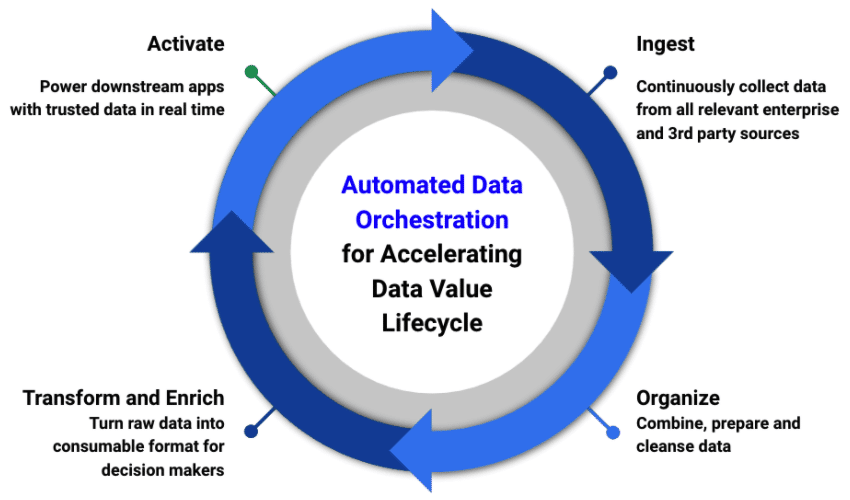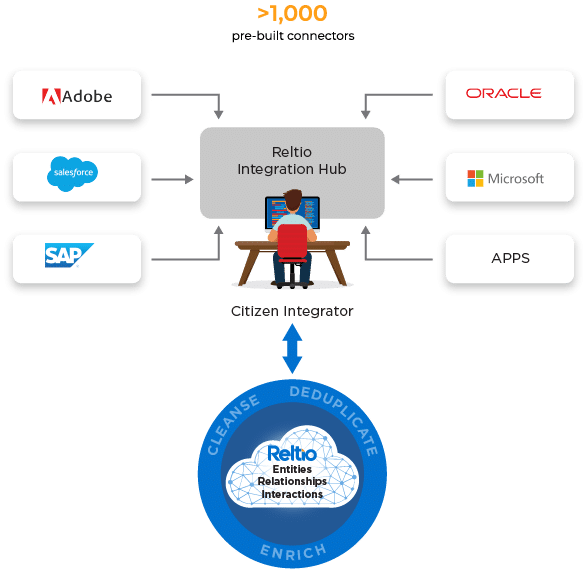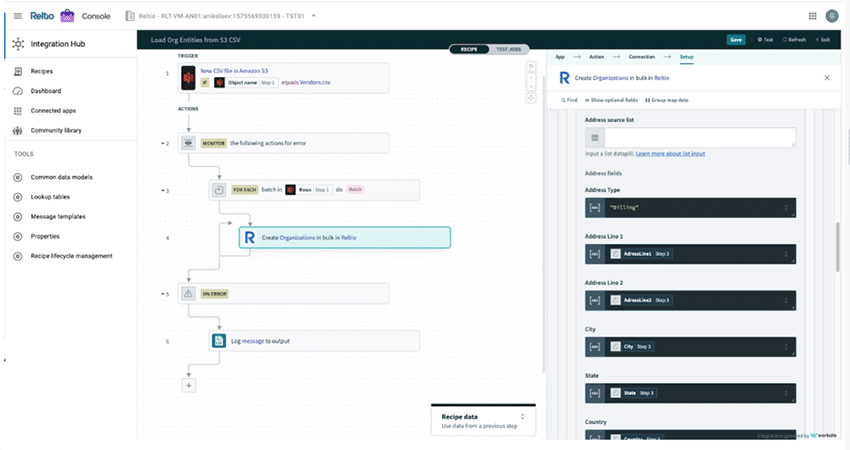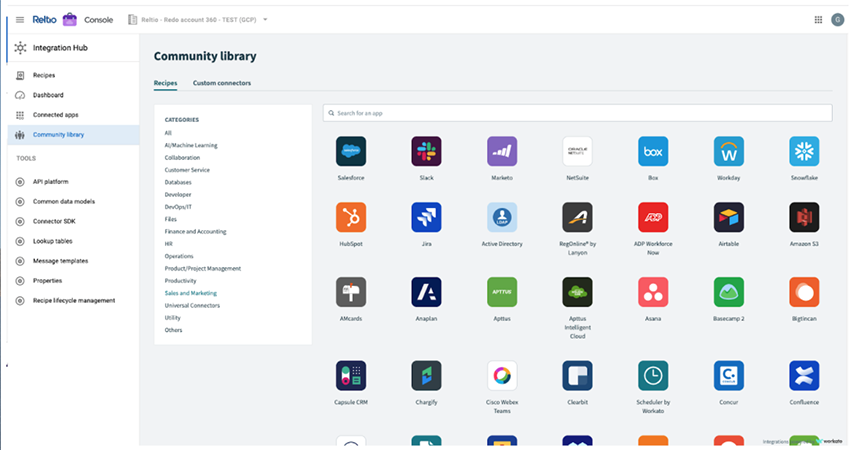Accelerating Data Value Lifecycle with Rapid and Simplified Integration: Introducing Reltio Integration Hub

Data is the lifeblood of an organization, yet it is, for the most part, an enormous challenge for organizations to properly wrap their arms around. Despite heavy investments in data and AI initiatives, companies find it hard to derive value from their investments and become data-driven organizations. According to “10 Steps to Creating a Data-Driven Culture” in the Harvard Business Review, the most common complaint from people in different parts of a business is that it’s difficult to obtain even the most basic data. Organizations are using a diverse set of applications and analytics platforms, both in the cloud and on premises. This proliferation of applications further worsens the data silos that exist already. To reap the full benefit from your data assets, you need to create a strong foundation for your data assets – unify your core data, make it reliable and trusted, and make it universally accessible. This is what Reltio excels at—helping our customers to accelerate value from their core data assets. Our cloud-native master data management platform turns data from internal and external sources into insight-ready, trusted data.
Self-service availability of this unified and trusted data is of paramount importance, and this is what we tackled next. Data democratization—that is, making data readily available to those who need it—is not a new concept. But it is now gaining importance due to proliferating data and its importance to digital transformation initiatives. You need to accelerate your data value lifecycle by simplifying the user experience and automating data orchestration and its activation. That’s what we worked on for our customers.

Introducing Reltio Integration Hub
We are super excited to introduce Reltio Integration Hub, designed to simplify your complex data integration environments and accelerate your end-to-end data value lifecycle. Powered by Workato, an iPaaS and enterprise automation leader, the new component of our Reltio Connected Data Platform provides a no-code/low-code capability to build data pipelines and workflow automation. It is intended for digital citizens—business analysts and data stewards without programming skills—to reduce the need for your IT resources. It provides an agile foundation for unifying your organization’s data through pre-built connectors for many applications, databases, files, and platforms. And its easy-to-use, drag-and-drop interface enables a faster integration process while providing visibility and centralized control of data integrations.
You can now set up as many integrations as you’d like with Reltio from your data sources, cleanse, organize and enrich your data, and distribute real-time trusted data wherever needed. You can automate your business processes and quickly set up a connected ecosystem of applications with Reltio powering your data hub. As your business needs evolve, you can rapidly expand your integrations and workflows to keep pace with the demands.

Reltio Integration Hub is available to all customers as part of the base package (i.e., free to get started) with a fair usage policy and provides a complete tool kit to:
- Build simple or complex ETL or ELT processes and data pipelines with an easy-to-use UI
- Fully automate your integration processes end to end
- Streamline integration orchestration via central monitoring, alerting, and troubleshooting
Key Features
- Integration Orchestration
Recipes (integration workflows) lie at the heart of Reltio Integration Hub. A citizen integrator builds a recipe to integrate applications with Reltio to extract data. It is a visual flow-chart-like tool in which your user builds the connections to applications, maps data, builds transformations and other logic, and constructs the data or integration pipeline. Unlike traditional integration projects, creating a recipe takes hours—maybe in some cases days—but not weeks or months.
Recipes are simple to build, yet powerful. A recipe consists of two components: a trigger and a set of actions. A trigger could be an event in an external application offering real-time execution, or you could run the recipe on a schedule or through a polling mechanism.
Actions allow you to build the logic and operations such as validations, transformations, enrichment, exception handling, and various other logging and alerts. There are also community-built recipes that you can quickly deploy in your instance and modify according to your requirements.
- Pre-built connectors and recipes
There are over 400 pre-built connectors to various cloud applications, on-premise systems, and platforms, along with over 1,000 community-built recipes available right within the platform. Pre-built connectors allow for faster connectivity to external applications and an easy way for you to map fields and build transformations.
- Reltio Connector
Reltio Integration Hub comes with a connector for Reltio to simplify building real-time and bidirectional integration. The connector has abstracted the most commonly used APIs and offered those actions, so you can perform various operations on entities, relationships, and interactions while building the integrations. - Secure, scalable infrastructure from Workato
Reltio Integration Hub is powered by Workato. Workato is built on a modern serverless infrastructure offering a fully cloud-native platform designed to auto-scale to support the rapid and virtually unlimited expansion of your compute and storage capacity. The platform offers role-based access management, end-to-end encryption with key rotation, masking, connector and recipe versioning, audit logs, and job history details—all with high availability and reliable cloud-native infrastructure.
What does Reltio Integration Hub mean for you?
Integration projects are rarely simple, fast, or inexpensive. With Reltio Integration Hub, you can link your applications to the Reltio Connected Data Platform faster and easier than ever before. Think hours or days, low TCO, and fast time to value. You no longer need an army of developers building integrations for months at a time—faster access to unified, trusted data to drive your real-time business operations.
Gartner Research says that, on average, 41% of employees outside of IT—what we call citizen integrators or developers—customize or build data or technology solutions. Organizations are going through a cultural shift. No-code/low-code applications blur the lines between IT and business, remove barriers that inhibit change and progress, and foster a new environment that embraces domain experts building the solutions they need. Reltio Integration Hub, with its pre-built connectors, a library of recipes, user-friendly UIs, and centralized dashboards, makes self-service integration a reality.
Self-service integration reduces the burden on IT while energizing business users. This means business and IT can focus more on innovation and driving new use cases for unifying critical business data and streamlining processes. Adding a new application that begs for integration? No problem! So not only do you benefit from faster, less costly integration projects, but you can get more value from the applications you adopt. By integrating data virtually from anywhere, including beyond the walls of your business, you can gain new insights that were not possible before.

The world is going through a tectonic shift that has been accentuated by the pandemic from engineering-driven IT to business-driven IT. Organizations that make this transition empower their business experts to make agile decisions and shape the path to leadership positions in their industry. By introducing Reltio Integration Hub, we aim to provide the appropriate tools to create the application and data integrations necessary to support and accelerate data-driven decisions. We are excited to help our customers redefine the playing field with a secure yet flexible data foundation during these turbulent times.
We have a community webinar coming up on Reltio Integration Hub on Thursday, October 28th. Please join us to discover more. We also invite you for a custom demo with a Reltio expert to see it in action.
References:
- https://www.forbes.com/sites/johneverhard/2019/01/15/what-really-is-low-codeno-code-development/?utm_source=xp&utm_medium=blog&utm_campaign=content&sh=56d28f82a8e2
- https://blogs.gartner.com/mei-selvage/2016/05/23/comparing-three-self-service-integration-architectures/
- https://www.computerweekly.com/microscope/opinion/In-pursuit-of-agility-empowering-the-citizen-integrator
- https://www.gartner.com/en/newsroom/press-releases/2021-02-15-gartner-forecasts-worldwide-low-code-development-technologies-market-to-grow-23-percent-in-2021
- https://hbr.org/2020/02/10-steps-to-creating-a-data-driven-culture